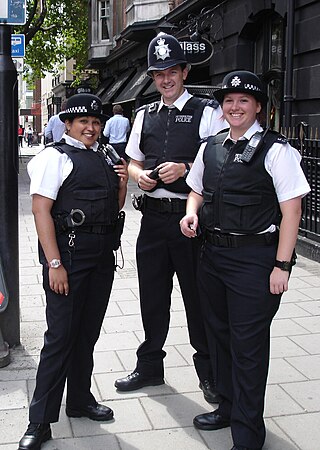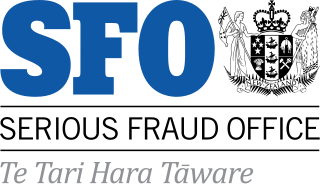| National Organised Crime Group | |
|---|---|
| Agency overview | |
| Formed | April 2017 |
| Preceding agencies |
|
| Jurisdictional structure | |
| National agency | New Zealand |
| Operations jurisdiction | New Zealand |
| Primary governing body | New Zealand Government |
| Secondary governing body | New Zealand Police |
| Operational structure | |
| Agency executives |
|
| Website | |
| https://www.police.govt.nz/careers/police-groups/national-organised-crime-group | |
The National Organised Crime Group, the original name was Organised and Financial Crime Agency of New Zealand (OFCANZ), which was renamed and merged into the New Zealand Police in April 2017. [2] [3] The group's stated objective is to "disrupt and combat organised crime".
The Fifth Labour Government in 2007 announced the intention to create the agency, saying it would replace the Serious Fraud Office. [4] [5] OFCANZ was formed on 1 July 2008 (though in December 2008, the new National Prime Minister John Key said that the Serious Fraud Office would not be abolished). [6]
The agency led its first raid on 28 October 2009, serving search warrants on members of the Tribesmen Motorcycle Club in Northland. [7]

Law enforcement in the United Kingdom is organised separately in each of the legal systems of the United Kingdom: England and Wales, Scotland, and Northern Ireland. Most law enforcement duties are carried out by those who hold the office of police constable of a territorial police force.

The New Zealand Police is the national police service and principal law enforcement agency of New Zealand, responsible for preventing crime, enhancing public safety, bringing offenders to justice, and maintaining public order. With over 15,000 personnel, it is the largest law enforcement agency in New Zealand and, with few exceptions, has primary jurisdiction over the majority of New Zealand criminal law. The New Zealand Police also has responsibility for traffic and commercial vehicle enforcement as well as other key responsibilities including protection of dignitaries, firearms licensing, and matters of national security.

Dame Vera Baird is a British barrister and politician who has held roles as a government minister, police and crime commissioner, and Victims' Commissioner for England and Wales.

The Serious Fraud Office (SFO) is a non-ministerial government department of the Government of the United Kingdom that investigates and prosecutes serious or complex fraud and corruption in England, Wales and Northern Ireland. The SFO is accountable to the Attorney General for England and Wales, and was established by the Criminal Justice Act 1987, an Act of the Parliament of the United Kingdom.
The Serious Organised Crime Agency (SOCA) was a non-departmental public body of the Government of the United Kingdom which existed from 1 April 2006 until 7 October 2013. SOCA was a national law enforcement agency with Home Office sponsorship, established as a body corporate under Section 1 of the Serious Organised Crime and Police Act 2005. It operated within the United Kingdom and collaborated with many foreign law enforcement and intelligence agencies.

Europol, officially the European Union Agency for Law Enforcement Cooperation, is the law enforcement agency of the European Union (EU). Established in 1998, it is based in The Hague, Netherlands, and serves as the central hub for coordinating criminal intelligence and supporting the EU's Member States in their efforts to combat various forms of serious and organized crime, as well as terrorism.

Al Yamamah is the name of a series of record arms sales by the United Kingdom to Saudi Arabia, paid for by the delivery of up to 600,000 barrels (95,000 m3) of crude oil per day to the British government. The prime contractor has been BAE Systems and its predecessor British Aerospace. The first sales occurred in September 1985 and the most recent contract for 72 Eurofighter Typhoon multirole fighters was signed in August 2006.

His Majesty's Revenue and Customs is a non-ministerial department of the UK Government responsible for the collection of taxes, the payment of some forms of state support, the administration of other regulatory regimes including the national minimum wage and the issuance of national insurance numbers. HMRC was formed by the merger of the Inland Revenue and HM Customs and Excise, which took effect on 18 April 2005. The department's logo is the Tudor Crown enclosed within a circle.
The Specialist, Organised & Economic Crime Command is a unit within the Gangs and Organised Crime group of Specialist Crime & Operations within London's Metropolitan Police Service. The unit's main responsibility is to both investigate and take steps to prevent fraud, along with a wide range of other fraudulent crimes which require specialist knowledge and training to investigate. The unit was previously known as the fraud squad, or by its previous Specialist Operations designation, SO6.

The Campaign Against Arms Trade (CAAT) is a UK-based campaigning organisation working towards the abolition of the international arms trade. It was founded in 1974 by a coalition of peace groups. It has been involved in several high-profile campaigns, including a legal challenge against the Serious Fraud Office's decision to suspend a corruption investigation into BAE Systems in 2007. On 27 September 2012, it was honoured with a Right Livelihood Award for its "innovative and effective campaigning".

The Serious Fraud Office is the public service department of New Zealand charged with detecting, investigating and prosecuting financial crimes, including corruption, of a serious and complex nature.

The National Policing Improvement Agency (NPIA) was a non-departmental public body in the United Kingdom, established to support police by providing expertise in such areas as information technology, information sharing, and recruitment.
A fraud squad is a police department which investigates fraud and other economic crimes, the largest of which in the United Kingdom is run by the City of London Police.

Crime in New Zealand encompasses criminal law, crime statistics, the nature and characteristics of crime, sentencing, punishment, and public perceptions of crime. New Zealand criminal law has its origins in English criminal law, which was codified into statute by the New Zealand parliament in 1893. Although New Zealand remains a common law jurisdiction, all criminal offences and their penalties are codified in New Zealand statutes.

Allan James Hubbard was a New Zealand businessman who lived in Timaru in the South Island of New Zealand, and was the founder of South Canterbury Finance, New Zealand's largest locally owned finance company. In 2006, the New Zealand Listener described Hubbard as the most powerful businessman in the South Island.

The National Crime Agency (NCA) is a national law enforcement agency in the United Kingdom. It is the UK's lead agency against organised crime; human, weapon and drug trafficking; cybercrime; and economic crime that goes across regional and international borders, but it can be tasked to investigate any crime. The NCA has a strategic role as part of which it looks at serious crime in aggregate across the UK, especially analysing how organised criminals are operating and how they can be disrupted. To do this, it works closely with regional organised crime units (ROCUs), local police forces, and other government departments and agencies.

Jami-Lee Matenga Ross is a New Zealand businessman and former politician. He was the Member of Parliament for Botany from a by-election in March 2011 until he lost his re-election bid at the 2020 general election.
Vincent Tchenguiz is an Iranian-British entrepreneur born in Tehran. Robert Tchenguiz is his younger brother. Tchenguiz is known as a major donor to the Conservative Party (UK) and an investor in the controversial company SCL Group, known for the Facebook–Cambridge Analytica data scandal involving its subsidiary.

This article discusses the responsibilities of the various agencies involved in combating corruption in New Zealand. New Zealand is regarded as having one of the lowest levels of corruption in the world.
Lisa Marie Osofsky is an American-British lawyer who served as Director of the UK's Serious Fraud Office (SFO) from September 2018 until August 2023. She was succeeded by Nick Ephgrave.